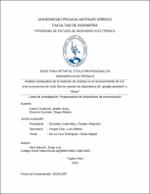| dc.contributor.advisor | Alva Alarcón, Jorge Luis | |
| dc.contributor.author | Castro Gutiérrez, Walter Andy | |
| dc.contributor.author | Dionicio Guzmán, Diego Alberto | |
| dc.creator | Castro Gutiérrez, Walter Andy | |
| dc.date.accessioned | 2023-11-22T15:20:04Z | |
| dc.date.available | 2023-11-22T15:20:04Z | |
| dc.date.issued | 2023 | |
| dc.identifier.uri | https://hdl.handle.net/20.500.12759/11691 | |
| dc.description.abstract | En este trabajo se presentó un estudio que tiene por finalidad el análisis y comparación
de aciertos entre los asistentes de reconocimiento de voz más utilizados “Google
Assistant” y “Alexa” sometidos ante la presencia del ruido blanco, para esto se aplicó
un diseño experimental basado en la utilización de los 10 comandos más usados por
los usuarios en cada uno de los asistentes virtuales, con estos comandos se procedió
a realizar las pruebas tanto con hombres y mujeres a las distancias de 1m, 1.5m y 2m
de los dispositivos de reconocimiento de voz; y para cada una de las distancia se
emitieron 14 intensidades diferentes de ruido blanco manteniendo siempre la distancia
de 0.05m del emisor del ruido al receptor.
Los resultados de estas mediciones arrojaron que el dispositivo Alexa tuvo un mejor
desempeño al obtener 55% de los aciertos con respecto a Google Assistant que obtuvo
un 47% por lo que, se concluye que Alexa en este análisis respecto al ruido blanco es
superior al de Google Assistant | es_PE |
| dc.description.abstract | In this work, a study was presented whose purpose is the analysis and comparison of
successes between the most used voice recognition assistants ““Google Assistant““ and
““Alexa““ subjected to the presence of white noise, for this an experimental design was
applied based on the use of the 10 commands most used by users in each of the virtual
assistants, with these commands the tests were carried out with both men and women
at distances of 1m, 1.5m and 2m from the recognition devices of voice; and for each of
the distances, 14 different intensities of white noise were emitted, always maintaining
a distance of 0.05m from the noise emitter to the receiver.
The results measured showed that the Alexa device had a better performance by
obtaining 55% of the correct answers with respect to Google Assistant which obtained
47%, therefore, it is concluded that Alexa in this analysis with respect to white noise is
superior to that of Google Assistant. | es_PE |
| dc.description.uri | Tesis | es_PE |
| dc.format | application/pdf | es_PE |
| dc.language.iso | spa | es_PE |
| dc.publisher | Universidad Privada Antenor Orrego | es_PE |
| dc.relation.ispartofseries | T_ING.ELECT_887 | |
| dc.rights | info:eu-repo/semantics/openAccess | es_PE |
| dc.rights.uri | https://creativecommons.org/licenses/by/4.0/ | es_PE |
| dc.source | Universidad Privada Antenor Orrego | es_PE |
| dc.source | Repositorio Institucional UPAO | es_PE |
| dc.subject | Alexa | es_PE |
| dc.subject | Aciertos | es_PE |
| dc.title | Análisis comparativo de la medición de aciertos en el reconocimiento de voz ante la presencia de ruido blanco usando los dispositivos de “google assistant” y “Alexa | es_PE |
| dc.type | info:eu-repo/semantics/bachelorThesis | es_PE |
| thesis.degree.grantor | Universidad Privada Antenor Orrego. Facultad de Ingeniería | es_PE |
| thesis.degree.name | Ingeniero Electronico | es_PE |
| thesis.degree.discipline | Ingeniería Electrónica | es_PE |
| dc.subject.ocde | http://purl.org/pe-repo/ocde/ford#2.11.00 | es_PE |
| renati.advisor.orcid | https://orcid.org/0000-0003-1288-933X | es_PE |
| renati.author.dni | 70294718 | |
| renati.author.dni | 72761076 | |
| renati.advisor.dni | 40294924 | |
| renati.type | http://purl.org/pe-repo/renati/type#tesis | es_PE |
| renati.level | http://purl.org/pe-repo/renati/level#tituloProfesional | es_PE |
| renati.discipline | 712026 | es_PE |
| renati.juror | González Cadenillas, Clayder Alejandro | |
| renati.juror | Vargas Díaz, Luis Alberto | |
| renati.juror | De La Cruz Rodríguez, Oscar Miguel | |
| dc.publisher.country | PE | es_PE |





